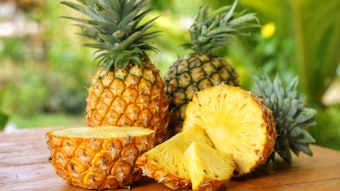A series of citrus oils--orange, distilIed lime, lemon, grapefruit and tangerine--were deterpenifled by a cold process utilizing a proprietary production scale poroplast extraction technique. The oils obtained are practically free of mono- and sesquiterpene hydrocarbons while the composition of the oxygenated components remains newly intact. This includes the low and high boiling oxygenated constituents of citrus oils which are usually lost during conventional deterpenification by fractional distillation. Being substantially more soluble in alcohol-water solutions, the new deterpenified oils also possess a noticeably higher stability under accelerated aging conditions in finished beverages. The detailed chemical composition of these oils is compared to a number of commercial terpeneless citrus oils prepared by conventional methods.
It is commonly agreed that the hydrocarbons naturally found in all essential oils contribute very little to the overall odor and flavor profile of the essential oil. Moreover, years of worldwide flavor and fragrance experience and research leaves no doubt that the presence of substantial quantities of hydrocarbons in the essential oil create very serious problems for the users of these products. The flavor intensity of hydrocarbon rich oils is generally Iow and these oils are poorly soluble in alcohol-water systems. Their major disadvantage, however, is the very high susceptibility of the hydrocarbons to be oxidized by air. The combined effect of chemical reaction following the hydrocarbon oxidation results in the complete deterioration of the oils’ odiferous profiles. Obviously, these problems are most serious in the case of citrus oils in which the hydrocarbons are found in quantities ranging from 95-99%.










